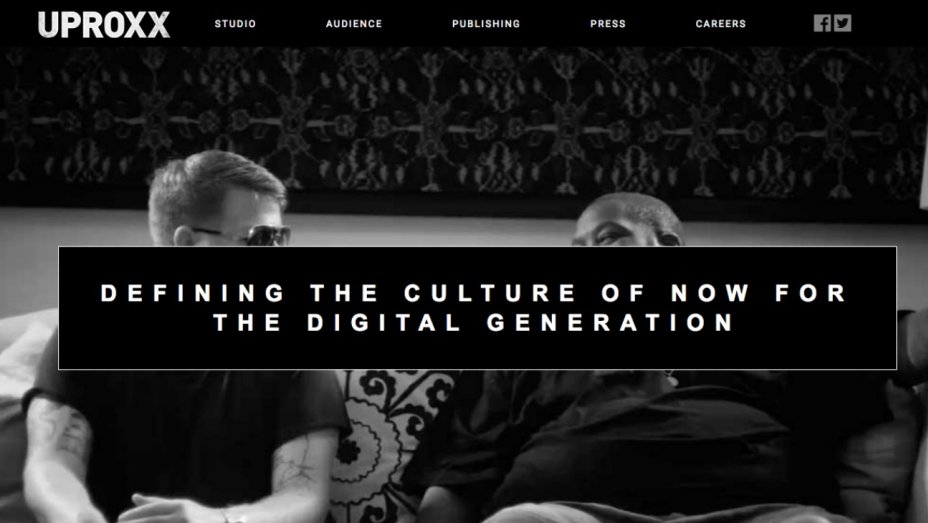Recently, Warner Music Group, parent to Warner Bros. Records, Atlantic Records, and ticketing platform Songkick, announced it had purchased millennial entertainment and lifestyle media brand Uproxx, parent to flagship Uproxx.com, film and TV site HitFlix, and sports site Dime. (Alas, the powers that be were not interested in acquiring BroBible.com.) The announcement was crammed with buzzwords: “Daily content and programming.” “Authenticity and transparency.” “Pioneering personalities and credible brands.” “Creative and entrepreneurial environment.”
The Warner/Uproxx acquisition comes at a moment when small media operations are increasingly being swallowed up by larger companies. Complex’s parent company is a joint venture between Verizon and media conglomerate Hearst. Rival magazine empire Condé Nast bought influential music website Pitchfork. Spin’s current parent company owns several publications (including Billboard and The Hollywood Reporter), as well as Dick Clark Productions and production houses A24 and MRC. Industrial-strength combinations make sense for big entertainment companies, because they offer bigger and wider potential audiences for bigger and more expensive advertising initiatives and financial ventures. There are natural “integrated marketing” and “synergy” opportunities within the larger company structures, too: Just last week, Spin received a press release titled “Pitchfork’s OctFest Unveils Food Lineup, Curated By Bon Appétit.” OctFest is the music festival hosted by Pitchfork’s beer site October, which is a partnership with Anheuser-Busch InBev; its food vendors were picked by Condé Nast’s legacy food publication, Bon Appétit.
As these business-focused acquisitions of primarily journalistic entities become more common, the new corporate structures raise obvious questions about basic editorial independence. Donald Trump’s cries of “Amazon Washington Post” aside, Jeff Bezos’s ownership opens the paper to real critique about the possibility for conflict tied to financial or political interests. Sooner or later, Uproxx’s editors will likely encounter a situation where the coverage they want to publish is at odds with the corporate prerogatives of a bureaucratic major record label. What happens then? In a press release announcing the acquisition, Warner said Uproxx’s “editorial and studio operations will function as stand-alone entities with journalistic and creative independence.” The company declined further comment to Spin.
No publication—including this one—is immune from such concerns, and the best solution is usually transparency. Branded and sponsored content is part of every site, and the industry standard is to distinctly note which content has been explicitly underwritten by another brand. That hasn’t always been a priority at Uproxx, where ordinary interviews and reviews also live alongside and within projects effectively funded by outside corporations or brands but rarely disclosing as much. The past few weeks have included “Behind the Scenes of a True Southern Whiskey-Hot Sauce Collaboration,” an article that includes the name “Tabasco” 15 times; a preview and a review of a barbecue and country music festival in Chicago, the latter revealing that the festival itself paid for some undisclosed portion of the trip; and interviews with two Australian EDM acts tucked inside something called “A Preview of Splash House, The Coolest Way to Get Soaked This Summer.” Most infamous is “Breaking Up in Joshua Tree Helped Me Understand My Own Twisted Heart,” the sponsor-affiliated personal essay that received its own Deadspin investigation, where even the essayist acknowledged the story had been widely mocked. Uproxx has responded by pointing readers to its policy on press trips, though it’s not readily visible on the site if you’re not looking for it. The policy amounts to this: “If we don’t like something—a food experience, a travel excursion, etc.—then we don’t cover it.”
Without the indirect financial backing or perks provided by brands, stories like those cited above would almost certainly not exist. Uproxx, an enthusiastic publication at heart, is by all appearances institutionally fine with this. (According to the L.A. Times, the site’s original parent company was renamed Uproxx Media Group in 2017 after it received funding from the massive advertising firm WWP.) The arrangement also happens to make the site particularly attractive to a buyer who would have a lot to gain from owning a fully integrated lifestyle brand. It’s not so different from Warner’s other recent fan-oriented website acquisition, Songkick, which helps users search for upcoming concerts and buy tickets. One company could theoretically sign the artist, sell their music, organize their tour, market and sell the tickets for that tour, and publish a story each step of the way. Maybe that story ends with a link to search local tickets. It’s sort of depressing, but such is the world in which journalism currently exists.
I mean no malice to my colleagues at Uproxx, who surely feel as fortunate as I do to work in the (increasingly tenuous) industry for which we all care deeply. Most smaller publications cannot afford the New York Times‘ lofty policy of never accepting a freebie. Like most music journalists, I have requested press tickets from publicists or labels, and sometimes covered their artists’ events. This is a condition of the business; the difference is that I don’t work for the people handing out those tickets, and I don’t answer to them, either. But what if a big Warner Bros. or Atlantic artist—Bruno Mars or Gorillaz, say—releases an album that’s straight-up terrible? Will Uproxx writers be able to say as much? What if the news is worse than bad music—what if it’s a #MeToo allegation, a public meltdown, or an arrest?
A major record label outright owning a publication with a prominent music focus is new territory. Theoretically, it positions Uproxx somewhere between traditional entertainment media and something like Urban Legends, Universal Music Group’s officially sanctioned outlet. It would be nice to know where on that spectrum, but until then, I have to doubt that the head honchos at Warner Music have a thoroughly detailed and ethically sound plan of action in place for their new stable of media sites. The rise of online advertising and social media—especially Facebook’s stranglehold on the attention economy—have perverted the industry’s incentives almost beyond recognition. The digital era fundamentally changed the media business; it will never be the same, and it will never be as profitable. With that, at least, the major labels are painfully familiar.





